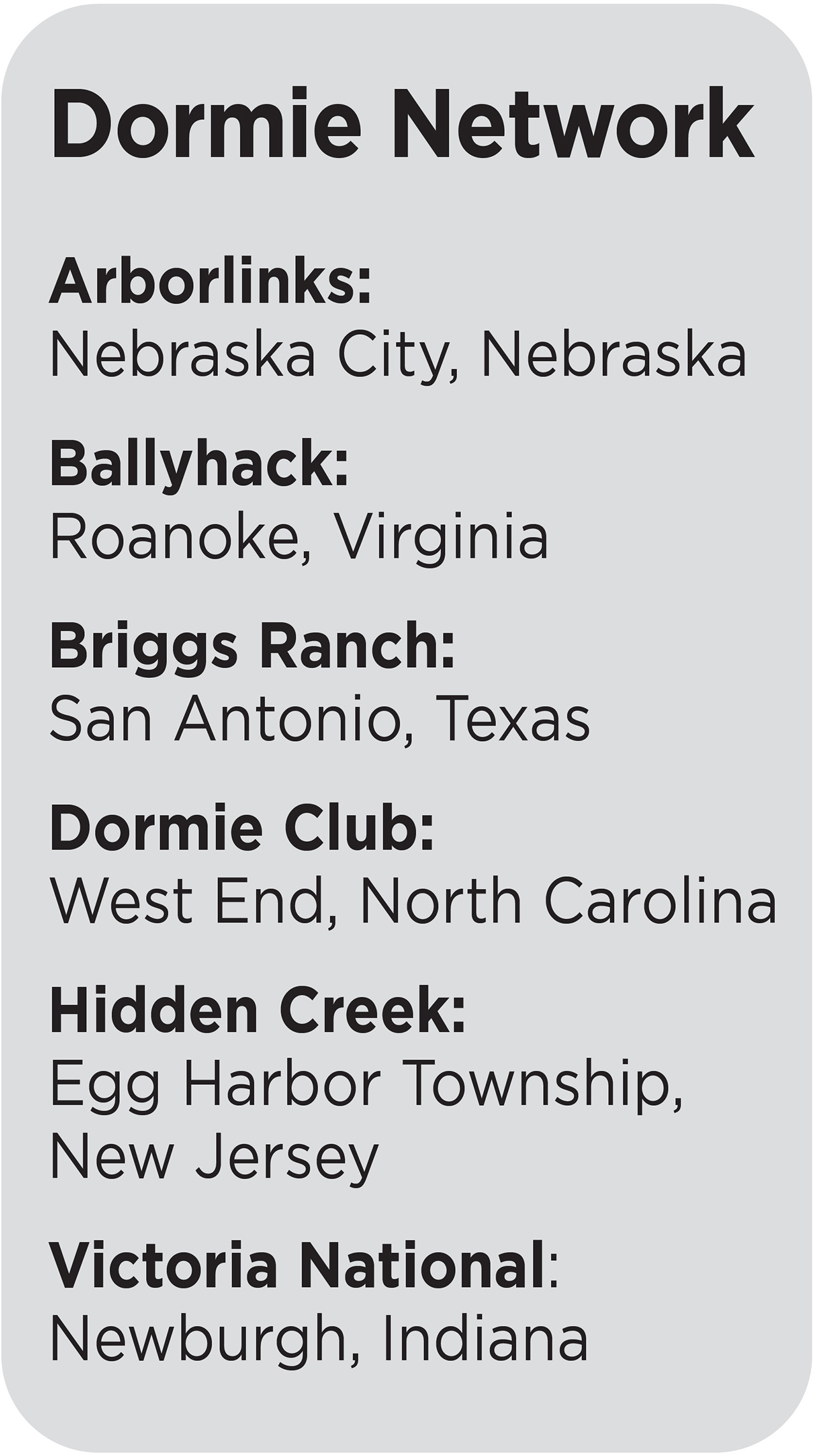Before the coronavirus injected uncertainty into every aspect of our lives, the previous quarter-century had seen an unprecedented expansion of options for those who love to travel to play golf.
Private clubs emerged in remote locales – e.g. Mullen, Nebraska, and Deer Lodge, Montana – that once would have been unthinkable. Mike Keiser’s transcontinental empire brought pure golf ideals to the destination resort. Meanwhile, a new breed of golf societies, led by the Outpost Club, married group travel with the camaraderie and friendly competition of club life.
Finding a niche in any of these highly competitive scenes isn’t easy, but since its foundation in 2016, the Dormie Network quickly has carved out territory all its own. In defining that niche, it’s perhaps most efficient to use the company’s own description: “(A) national network of clubs combining the experience of destination golf with the premier hospitality of private membership.”
The Dormie Network is one of many projects by the entrepreneurial Peed family of Lincoln, Nebraska. Tom and Rhonda Peed built the foundation of the family’s wealth from an array of trade publications directed toward the agriculture and construction industries, among many others. Their entry into the golf industry is being led by their youngest son, 28-year-old Zach, a former collegiate golfer at Nebraska Wesleyan.

The six-course network did not begin as such but rather with the purchase of a single club, ArborLinks, a 2002 Arnold Palmer design 45 minutes south of Omaha. The company gradually expanded from that base, acquiring a carefully curated selection of courses by name-brand designers: Lester George’s Ballyhack; Tom Fazio’s Briggs Ranch and Victoria National; and Bill Coore and Ben Crenshaw’s Hidden Creek and Dormie Club – the company’s namesake. With the exception of the Dormie Club itself, each property features high-end accommodations, and lodging at that Pinehurst-area gem will be operational in 2021.
Along the way, Zach Peed began to see economies of scale and network potential in this portfolio of acquisitions. All came with existing slates of legacy members, which were folded into the national network. Clubs that grant playing rights to multiple courses are nothing new, but most previous such operations were regional in scope and the properties involved tended to vary in quality.
Not so with the Dormie Network.
“Whether they’re coming from across the country or just up the street, we want members to feel like they’re coming to their home club,” said David Plaster, Dormie Network’s chief marketing officer. “It’s been great to see people explore these courses that are now a part of their membership. Each club has a different feel based on regionality – the menu is different at Briggs Ranch in Texas than it is at Hidden Creek in New Jersey – but the underlying experience is the same.”
This consistency is especially desirable for avid golfers who like to build corporate or client entertainment around the game.
“Any time they entertain, that’s our wheelhouse,” said Phil Owenby, Dormie’s chief development officer and a golf industry veteran who previously served in leadership roles at Kinloch Club near Richmond, Virginia, and Chechessee Creek Club in coastal South Carolina. “Our teams are really focused on the hospitality and service side of creating great relationships.”

The Dormie Network takes an innovative approach based on anticipation and data collection. On a basic level, Plaster said, the network creates and shares custom profiles in order to be predictive. For example, a Ballyhack member may be making his first visit to Briggs Ranch, but the staff in Texas will know that he favors size L polos from Peter Millar, likes vodka transfusions at the turn and always wants the latest Titleist driver in the bag. The network has even created a personal shopping service – like a Trunk Club for golfers – to further leverage this data.
With the recent launch of the Dormie Network Institute, the company also has shown its commitment to using this approach to improve its members’ games.
In the same way that doctors’ offices share medical records, the pro staff at one property will know a member visiting from 1,000 miles away swings the driver at 95 mph and has worked on a particular set of drills to combat a hook. Staff pros sometimes travel with members to provide on-course instruction. And on a local level, the network often uses its pull with celebrity instructors to create one-of-a-kind experiences that combine clinics with top-flight food-and-beverage offerings.
Plaster says this focus on improvement simply makes good business sense.
“The better you play, the more fun you have,” he said. “You want to play more, and you travel more to see other properties.”
To further support this goal, in 2019 the network launched the Dormie Matches, a biannual Ryder Cup-style event designed to foster interclub friendships.
It’s clear the Dormie Network is still in expansion mode. The Peed family recently acquired Wolf Point Ranch, a Mike Nuzzo-designed private estate course about two hours southeast of Houston on the Gulf Coast that boasts near-mythical cachet among architecture aficionados, though it remains to be seen how (or even if) it will be incorporated into the network.
Other high-end properties may prove to be more motivated to sell in the pandemic environment, and Plaster does not rule out the idea of one day building something from the ground up.
“Sure, we’d love to create something that’s built for how we do things,” he said. “And there are only about 140 [existing] properties that fit our model. You just have to weigh when to buy versus when to build and consider the trade-offs involved in that decision.”
Owenby sees another silver lining to the coronavirus era.
“People realized they’d been too busy,” he said. “Our families were growing up around us. Golf is a great opportunity to unplug and be with those people you care about the most. In the Dormie Network, you’re part of a family, too. Ultimately the goal is that members want to visit with their friends at the other clubs.”
It will be interesting to see if this family-style atmosphere continues to prevail as the Dormie Network expands, but we wouldn’t bet against it.
[lawrence-related id=778063160,778062338,778062306]
